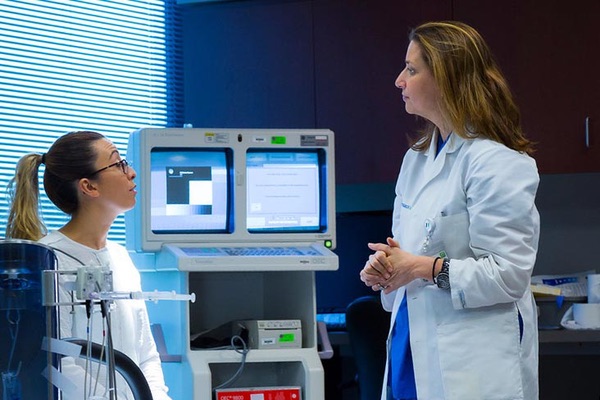Urinary Tract Infection (UTI) Care in New Jersey
Recurrent urinary tract infections (UTIs) more commonly affect women and, because they come frequently and without warning, can negatively impact your quality of life. At Hackensack Meridian Health, you receive comprehensive care from internationally known experts who publish studies and present internationally on the management of UTI.
Our specialists have expertise in the diagnosis and ongoing management of UTI. We can identify any underlying causes so we can effectively treat and prevent future infections.
Symptoms of a Urinary Tract Infection
A UTI is caused by specific types of bacteria that can enter the urinary tract and bladder and cause inflammation. Urinary tract infections can range from bothersome to painful and cause symptoms including:
- Blood in the urine – appears red, pink or light brown
- Feeling the need to urinate even when you’re finished
- Fever
- Frequent and urgent need to urinate
- Pain in the pelvis, side or lower back
- Pain or burning when urinating
If you experience any of those symptoms and suspect you have a UTI, contact your doctor to seek immediate treatment. If you experience recurrent (frequent) UTIs, you should visit a urologist who can diagnose the cause and offer a treatment plan.
Treatment for Recurrent Urinary Tract Infection
You should see a urologist if you have urinary tract infections that are “recurrent,” meaning you have:
- More than two UTIs in six months
- Three or more in one year
You will receive a personalized and holistic treatment plan that may include changes to your behavior and diet, taking supplements and medication, or using vaginal creams – all designed to reduce the frequency of UTI and make your life better.
We sometimes partner with gynecology and infectious disease specialists to treat an underlying condition causing your UTIs. Hackensack Meridian Health urologists are involved in emerging treatments for recurrent UTI and you may be able to participate as part of a clinical trial.
Are You at Greater Risk for UTI?
You may be at an increased risk for developing a UTI due to:
- Abnormal urinary tract structure
- Compromised immune system due to diabetes, pregnancy, multiple sclerosis or another condition
- Impaired urine flow from kidney stones, stroke or spinal cord injury
- Sexual activity
- Use of spermicide jelly birth control
- Vaginal dryness due to menopause
Why Choose Hackensack Meridian Health Urology
Urological Expertise
The Department of Urology at Hackensack University Medical Center, a nationally ranked program by U.S. News & World Report, is renowned for its high-quality urologic care, including excellence in research and clinical outcomes.
- 6 subspecialties with fellowship-trained urologists
- 2 Joint Commission Disease-Specific Care Certifications in prostate cancer and kidney cancer
- 6 consecutive Magnet designations by the American Nurses Credentialing Center for nursing excellence
Frequently Asked Questions About UTIs
Urinary tract infections can range from bothersome to painful and cause symptoms including:
- Blood in the urine – appears red, pink or light brown
- Feeling the need to urinate even when you’re finished
- Fever
- Frequent and urgent need to urinate
- Pain in the pelvis, side or lower back
- Pain or burning when urinating
If you experience any of those symptoms and suspect you have a UTI, contact your doctor to seek immediate treatment. If you experience recurrent (frequent) UTIs, you should visit a urologist who can diagnose the cause and offer a treatment plan.
A UTI is caused by specific types of bacteria that can enter the urinary tract and bladder and cause inflammation. Some things that increase the chance of getting a UTI include:
- Being pregnant
- Having a condition that block the urinary tract, such as kidney stones
- Having a urinary catheter
- Having a weakened immune system
- Having sex
- Not drinking enough fluids
Our urologists don’t just diagnose and treat UTI, we help you prevent future infections. Some strategies we recommend for preventing UTIs include:
- Avoiding foods and beverages that can irritate the urinary tract
- Altering bathroom habits and hygiene
- Avoiding products or birth control that can cause irritation
- Drinking lots of water
- Emptying your bladder frequently and completely
- Estrogen therapy for menopausal women
- Medications
- Taking supplements such as cranberry, D-Mannose, probiotics and vitamin C














